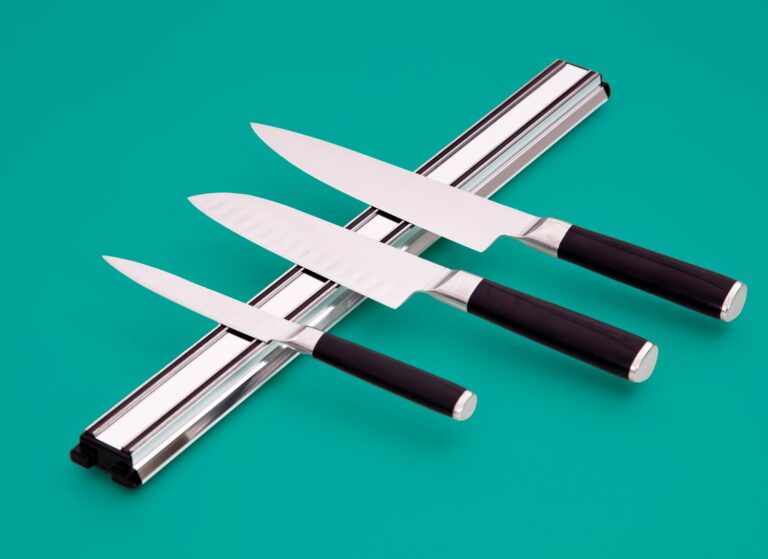Knives are a chef's most important tool. Treating them improperly can mean missing out on valuable culinary possibilities. Keeping your knives in tip-top condition and caring for them is a key component of any kitchen, and no one knows this better than a chef. We asked professional chefs to share the most common mistakes home cooks make with their knives and how to easily correct them for smoother, sharper cuts in the future. Here are the top 8 mistakes people make with their knives and how to improve your knife skills.
Do not leave the knife wet
After hand-washing your knives, have a dry towel or microfiber cloth ready. “Dry your knives immediately after washing them; don't leave them out,” says Chaya Rapoport, culinary manager at the Jewish Culinary Institute. Allowing your knives to air dry can cause the blade to dull or rust faster. Of course, this also means not leaving your knives soaking in the sink overnight. For best results, wash and dry quickly.
Do not put the knife in the dishwasher
There's a reason why Airbnb's famously dull knives are notorious: they've been in the dishwasher too many times. As a general rule, any utensil that requires a sharp blade shouldn't be washed in the dishwasher, as it can dull and damage the blade. “One of the biggest mistakes I see households make is putting their kitchen knives in the dishwasher,” says Christopher Weathered, chef and co-owner of Mill & Main in Kerhonkson, New York. “Make sure you hand-wash them, scrub them properly with soapy water, and dry them immediately. If you leave your knives outside to air dry too often, they can easily rust and become ruined.”
The blade is not a sharpener
“Avoid using the sharp side of your knife to scrape things off the cutting board, and use the back of the knife to avoid dulling the knife,” says Rapoport. You can also break this bad habit by using a bench scraper (a tool designed for lifting and carrying food) only for cutting, not carrying the knife.
Choosing the wrong knife
“Most people get duped into buying knives that are beyond their skill level or that are too cheap,” says Dale Talde, chef and owner of Goose Feather in Tarrytown, New York. “High-end Japanese knives are for professionals and experienced cooks who know how to care for and sharpen them. If you choose something really cheap, you're getting a crappy knife that will dull after just a few uses. For the home cook, I recommend a Forschner or Victorinox. They're easy to sharpen, stay sharp for a long time, and are affordable. Once you're comfortable using and caring for your knives, you can level up.”
Sharpening your knives
Knives need to be sharpened to do their job. “Most people don't sharpen their knives enough,” says Rapoport. “I recommend sharpening them. [them] You should sharpen them at least twice a year.' Learn how to sharpen your knives yourself, or have a professional give you a quick tune-up.
If sharpening is too much of a hassle, choose a serrated blade.
“I find that a lot of home cooks are using very expensive, dull knives. After all, the quality of the knife means nothing if you don't sharpen and polish it,” says Chase David, executive chef and partner at BriDer in Denver. “Before you upgrade to something nicer, I recommend learning how to properly use a whetstone. And when in doubt, serrated knives will stay sharper longer and can be used for more than just bread.”
Store your knives properly
“One common mistake I see is people slamming their knife into the magnetic knife holder, which can damage the edge,” says Chinese-American chef and cookbook author John Kun. “To properly insert your knife into the holder, first place the back (non-cutting blade) of the knife into the magnetic knife holder, then gently rock or close the knife until the blade (cutting part) releases from the holder. Ideally, there should be no noise when the edge hits the block.”
However, as long as you do it correctly, it is a good idea to stick your knife on magnetic tape.
“Never store your knives edge-down in your utensil cupboard as this can cause the blade to bend or become dull,” adds pastry chef and upcoming author Clarice Lam. Breaking the packageInstead, stick them on magnetic tape, store them in a knife drawer lined with cork, or store them flat with a knife cover.
Serrated blade is ideal for acidic foods
“Cutting or slicing acidic foods like tomatoes, lemons and citrus fruits with a good knife is one of the biggest mistakes,” says Andrea Conguista, executive chef at Pasta Beach Boston, Newport, Providence and Mister R. “The acid corrodes the blade edge, which causes the knife to deteriorate faster. Therefore, it's best to use a serrated knife for acidic foods. The grooves between the knife blades don't need to be super sharp to cut, so you can use the knife blade for other purposes.”


